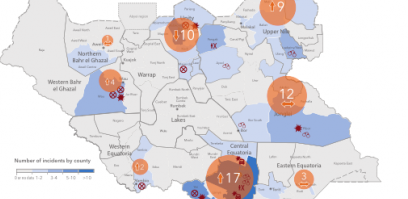Map: Interference with humanitarian work in South Sudan

The UN Office for Coordination of Humanitarian Affairs (OCHA) says a total of 58 access incidents were recorded in South Sudan in October.
A map published by OCHA, available for download below, shows that the majority of access incidents occurred in Juba, Rubkona, Yei, Pibor, Wau and Fangak areas.
The number of reported access incidents includes violence against staff and assets, assault, detentions, burglaries and ambushes.
“Nearly a quarter (24 per cent) involved bureaucratic and administrative impediments, which represents the highest number of such incidents reported in any month so far in 2018. Sixteen incidents (28 per cent) were of a severe nature, involving the killing and assault of aid workers, prolonged detentions of 27 staff in six separate incidents, restrictions of movement, and two serious road ambushes in Central Equatoria,” the UN agency explained.
The UN agency said insecurity in Baggari continues to prevent humanitarian partners from assisting people in need in areas such as Ngok, Ngisa and Mboro, despite a high level mission to broker sustained access in August.
It added that bureaucratic impediments and demands for fees continued unabated in the Sobat corridor and Greater Upper Nile region, with renewed directives issued by non-state civilian authorities relating to increased taxation, landing fees, and consequential threats of expulsion.
“While Ebola preparedness measures are fully underway, insecurity and poor road conditions in areas such as Libogo and Otogo in Yei County have challenged access in order to identify potential screening points. Planning started for a security assessment and access negotiation mission on the Yei-Maridi road to facilitate activities,” OCHA said.